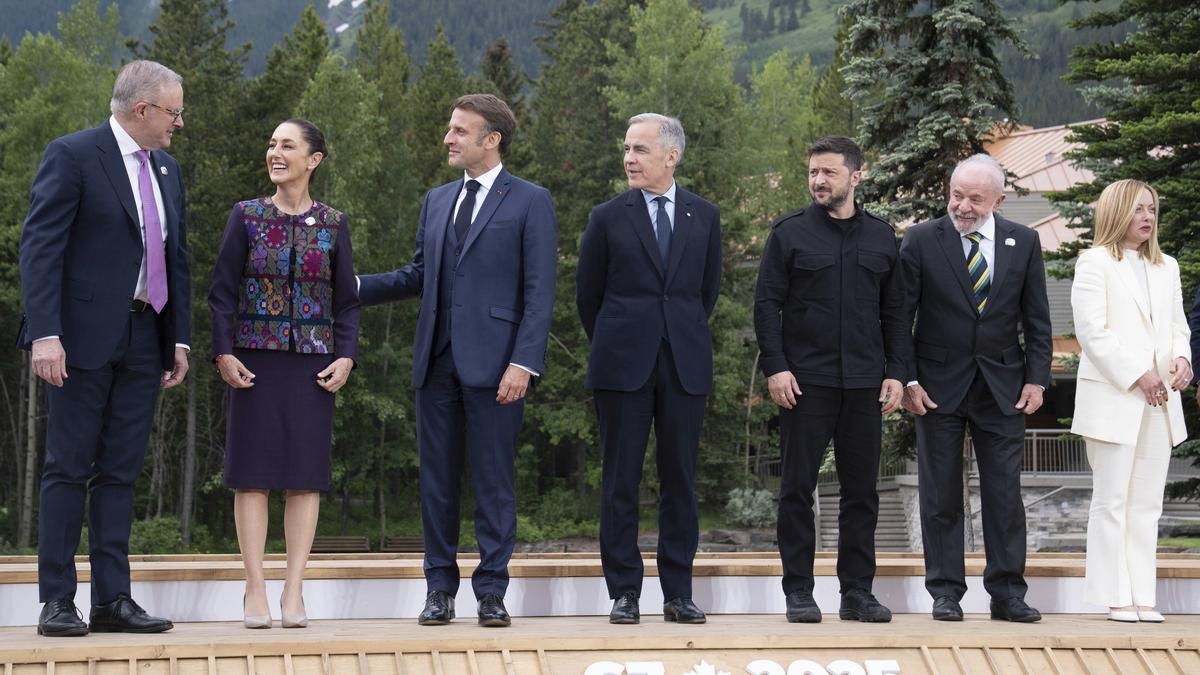The 2025 G7 summit, held in Kananaskis, Canada, ended on Wednesday, June 18, 2025, without a joint declaration of support for Ukraine, exposing growing divisions within the alliance of major industrialized democracies.
A key factor in this breakdown, according to online media sources, was the early departure of U.S. President Donald Trump.
This reportedly prevented any unified stance on the conflict in Eastern Europe and underscored the shifting dynamics within the group.
Ukrainian President Volodymyr Zelenskyy attended the summit in hopes of securing additional backing from Western allies.
This came as his country continues to defend itself against Russia’s ongoing military invasion.
Throughout the event, he held discussions with leaders from Canada, the United Kingdom, France, Germany, Italy, Japan, and NATO’s newly appointed Secretary General, Mark Rutte.
However, a critical meeting with President Trump—considered the most influential figure in the group, did not take place.
Trump abruptly left the summit a day ahead of schedule to return to Washington and address the escalating conflict between Israel and Iran, an issue he prioritized over the Ukraine agenda.
Following the summit, Zelenskyy voiced his concerns about the current state of global diplomacy, declaring that “diplomacy is now in a state of crisis.”
He urged the remaining G7 members to continue urging President Trump to use his considerable influence to help bring about an end to the war in Ukraine.
Zelenskyy reiterated the importance of unified international action and emphasized that only consistent pressure on the Kremlin could lead to a lasting and just peace.
Confusion over the G7’s position on Ukraine arose when a Canadian official told reporters that a proposed joint statement had been abandoned due to resistance from the U.S. delegation.
This allegedly sought to dilute the language of the declaration.
However, this claim was later walked back. Emily Williams, a spokesperson for the Canadian prime minister, clarified that no formal draft statement on Ukraine had been shared with the other G7 leaders.
Nevertheless, another unnamed Canadian official told AFP that Trump’s desire to continue engaging with Russian President Vladimir Putin played a role in the decision not to pursue a unified statement.
According to that source, finding language that all G7 members could agree on under those circumstances was simply not feasible.
President Trump further demonstrated the divisions within the group by publicly stating that expelling Russia from the G8 (now the G7) following its annexation of Crimea in 2014 had been a mistake.
This comment contradicted the firm stance taken by most of the other member nations and underscored the difficulty of presenting a consistent position on Russia within the G7 framework.
Despite the disunity, Canada reaffirmed its commitment to Ukraine.
Prime Minister Mark Carney announced a new package of military assistance totaling 2 billion Canadian dollars (approximately $1.47 billion USD).
Canada also introduced additional financial sanctions targeting Russian assets and entities, signaling its ongoing support for Ukraine’s sovereignty and resistance to Russian aggression.
In addition to the war in Ukraine, the summit addressed other pressing global issues, most notably the escalating conflict between Israel and Iran.
Before his departure, President Trump did approve a separate group statement focusing on that crisis.
The declaration expressed strong backing for Israel’s right to defend itself and identified Iran as a primary source of instability and terrorism in the region.
While the statement called for de-escalation, Trump’s social media posts hinted at a potentially larger American military role, adding to the tension surrounding his administration’s approach.
Ultimately, the 2025 G7 summit revealed serious fractures within the group, particularly concerning their approach to Ukraine and relations with Russia.
While countries like Canada reiterated their unwavering support for Kyiv, the inability to issue a unified statement reflected the broader diplomatic challenges facing the West.
Trump’s early departure and diverging views among member states illustrated how increasingly complex it has become for the G7 to present a cohesive front on critical international issues.







